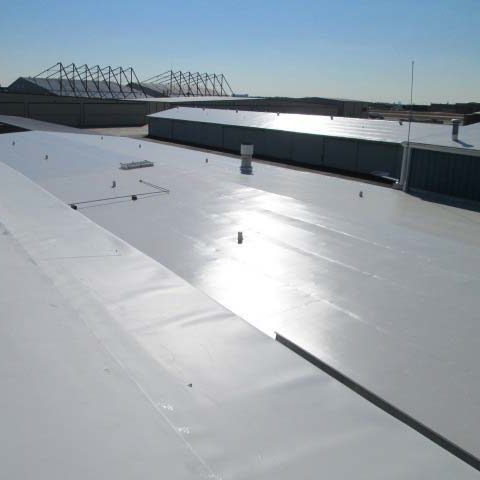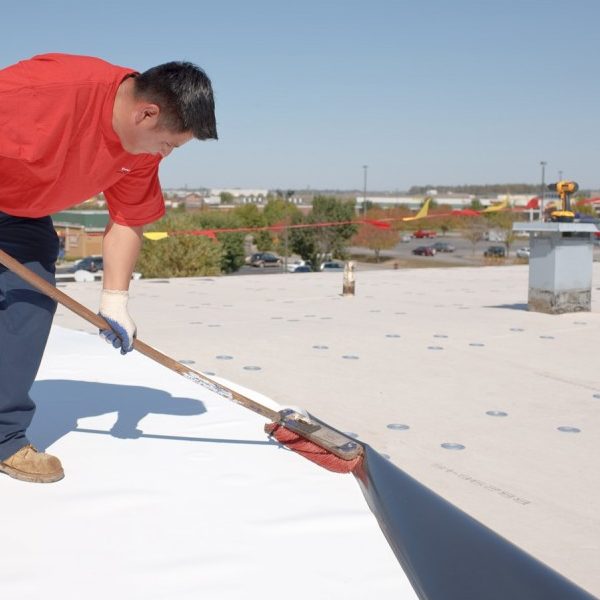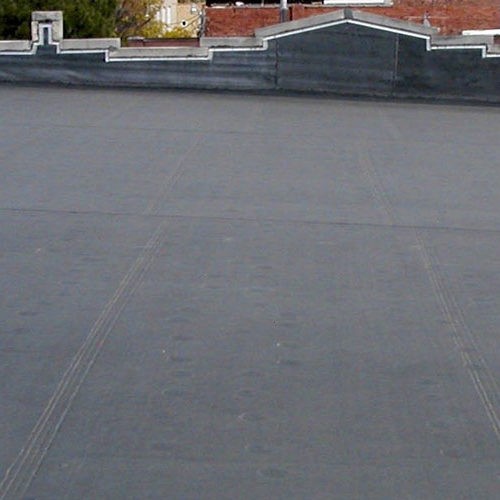When it comes to choosing a commercial roof, there are so many different materials to choose from.
Which one is right for your business?
Commercial PVC Membrane Materials: Pros & Cons
Polyvinyl chloride (PVC) is one of the most popular and time-tested membrane material used in roofing today.
Advantages
By far one of the largest advantages of PVC roofing materials would be it’s durability, longevity, and fire retardant properties.
This membrane has been flame tested alongside other similar membranes with very surprising outcomes.
While a TPO and EPDM membrane can continue to burn, spread and melt the material, the PVC membrane will work to self-extinguish the flames. This is incredibly important for your rooftop should any fires occur. Instead of huge areas of membrane melting away during a rooftop fire like with other membrane materials, PVC leaves you with more roofing membrane left and less to have to replace or repair.
In addition to great fire resistance properties, PVC is also resistant to moisture, wind, and chemicals as well as being tear and puncture resistant.
Due to the light colored membrane sheets and thicker insulation, it is also highly energy efficient. Reduce costs on your heating and cooling bills and avoid a heat island effect if you live in hotter areas
Disadvantages
The only real downside that might be considered for some building owners is the slightly higher up-front cost of PVC roofing compared to TPO or EPDM.
However this is a small price to pay for the durability, longevity, energy efficiency, warranty and fire resistance that PVC has.


Commercial TPO Membrane Materials: Pros & Cons
Thermoplastic polyolefin (TPO) is a newer style of commercial roofing membrane. First used as a roofing material in 1986, it is praised for being an affordable, cost-effective alternative to PVC.
Advantages
Today, TPO is one of the most common single-ply roofing material used with sales growing at a double-digit rate year over year. Many building owners have chose TPO materials over other options due to a cheaper up-front cost compared to other materials.
TPO membranes are very durable and flexible, which makes custom edge-to-edge fabrication simpler, cheaper and more efficient. The flexibility helps the material stretch and adapt to your building’s movement and setting.
The material is also 100% recyclable and eco-friendly.
The membrane is slick and good for moving water off the roof. Its lightweight property puts less stress on the building structure than does metal roofing. The flexibility of membrane roofing materials allows commercial roofing contractors to mold the material to unique roof designs.
TPO membrane’s light color is good for reflecting heat away from the building. TPO membrane comes in white, tan, gray, green, red, and blue. This material uses a hot-air gun to seal the seams
Disadvantages
One of the biggest downsides to using TPO is that it simply hasn’t been used for roofing as long as other materials. For that reason, some people question the longevity compared to PVC or EPDM roofs
Commercial EPDM Membrane Materials: Pros & Cons
EPDM stands for ethylene propylene diene methylene. This is a durable, darker synthetic rubber material primarily used in flat and low-sloped roofs nationwide.
Advantages
While most EPDM rubber roofs are black, it can also come in a white coating which will help with reflecting the suns heat off of the rooftop. Due to it’s rubber properties, it is able to easily stretch and form-fit to any roof.
EPDM roofing membrane has been on the market for over 60 years and is one of the top commercial roof materials.
Because of it’s darker color, it is a good choice for cooler climates. It’s highly durable rubber provides excellent protection from the weather. Seams are closed with adhesives or seam tape.
Since the membrane does not have its own insulation, the building owner has several insulation options to choose from.
Disadvantages
Hot weather can cause the membrane to shrink, causing tear which lead to water getting under the membrane. Adhesives and seam tape can degrade from UV sunlight, allowing water to flow under the membrane.Proper installation, maintenance, and repair procedures are necessary to keep the membrane lasting longer.

Industry Elite Services offers each of these kinds of commercial roofing and more! Call us today!
